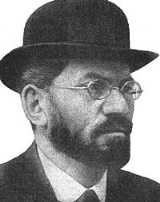
Menahem Mendel Beilis
Encyclopedia
Menahem Mendel Beilis, 1874 – July 7, 1934, (sometimes spelled Beiliss; ) was a Ukrainian Jew accused of ritual murder (see Blood libel
) in Kiev
in the Russian Empire
in a notorious 1913 trial, known as the "Beilis trial" or "Beilis affair". The process sparked international criticism of the antisemitic policies of the Russian Empire
. Beilis's story was the basis for Bernard Malamud
's novel The Fixer, which won both the Pulitzer Prize
and the National Book Award
.
and the Holidays
. In 1911 he was an ex-soldier and the father of five children, employed as a superintendent at the Zaitsev brick factory in Kiev
.
disappeared on his way to school. Eight days later his mutilated body was discovered in a cave near a local brick factory.
Beilis was arrested on July 21, 1911, after a lamplighter testified that the boy had been kidnapped by a Jew. A report submitted to the Tsar
by the judiciary regarded Beilis as the murderer of Yushchinsky.
Menahem Beilis spent more than two years in prison awaiting trial. Meanwhile, a vicious antisemitic campaign was launched in the Russian press against the Jewish community, with accusations of the blood libel and ritual murder.
Among those who wrote or spoke against false accusations of the Jews were Maxim Gorky
, Vladimir Korolenko
, Alexander Blok
, Alexander Kuprin, Vladimir Vernadsky
, Mykhailo Hrushevsky
, Pavel Milyukov
, Alexander Koni, and others.
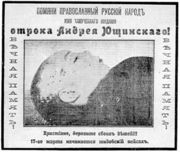
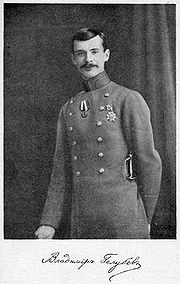
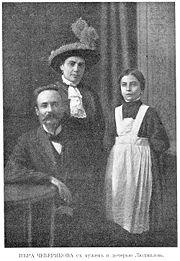
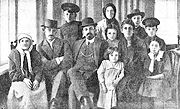 During the pre-trial period in 1911−1912 the investigation was conducted by Nikolay Krasovsky (Николай Александрович Красовский), the foremost investigator of the Kiev Police Department. Krasovsky forsook any prospect of promotion and continued his investigation in spite of resistance and sabotage from the circles interested in railroading Beilis; he eventually refused to participate in the outright falsification of the case and was fired.
During the pre-trial period in 1911−1912 the investigation was conducted by Nikolay Krasovsky (Николай Александрович Красовский), the foremost investigator of the Kiev Police Department. Krasovsky forsook any prospect of promotion and continued his investigation in spite of resistance and sabotage from the circles interested in railroading Beilis; he eventually refused to participate in the outright falsification of the case and was fired.
Krasovsky continued his investigation privately, assisted by his former colleagues from the Kiev Police Department. They eventually were able to determine the actual killers of Yushchinsky, who were professional criminals: Rudzinsky, Singayevsky, Latyshev, and Vera Cheberyak, whose son Yevgeny was a friend of Yushchinsky's.
On 30-31 May, 1912, reports were published in Kiev's newspapers. Immediately after this, Krasovsky was arrested on charges of official misuse allegedly committed in 1903 but acquitted by a court.
The trial took place in Kiev from September 25 through October 28, 1913. The prosecution was composed of the government's best lawyers. Professor Sikorsky of Kiev State University (father of Igor Sikorsky
, the inventor of the helicopter), a medical psychologist
, testified as an expert witness
for the prosecution that in his opinion it was a case of ritual murder.
One prosecution witness, presented as a religious expert in Judaic rituals, was a Catholic
priest, Justinas Pranaitis
from Tashkent
, well known for his antisemitic 1892 work Talmud Unmasked. Pranaitis testified that the murder of Yushchinsky was a religious ritual, associating the murder of Yushchinsky with the blood libel
, a hoax believed by many Russians at the time. One police department official is quoted as saying:
Beilis was represented by the most able counsels of the Moscow
, St. Petersburg
, and Kiev bar
s: Vasily Maklakov
, Oscar Gruzenberg
, N. Karabchevsky, A. Zarudny
, and D. Grigorovitch-Barsky. Two prominent Russian professors, Troitsky and Kokovtzov, spoke on behalf of the defense in praise of Jewish values and exposed the falsehood of the accusations, while professor of Kiev Theological Seminary Orthodox Christian
philosopher Alexander Glagolev affirmed that "the Law of Moses
forbids spilling human blood and using any blood in general in food
." The well-known and respected Rabbi of Moscow
, Rabbi Mazeh, delivered a long, detailed speech quoting passages from the Torah
, the Talmud
and many other books to conclusively debunk the testimony of the prosecution "experts".
The lamplighter, on whose testimony the indictment of Beilis rested, confessed that he had been confused by the secret police.
Pranaitis' credibility rapidly evaporated when the defence demonstrated his ignorance of some simple Talmudic concepts and definitions, such as hullin, to the point where "many in the audience occasionally laughed out loud when he clearly became confused and couldn't even intelligibly answer some of the questions asked by my lawyer." A Tsarist secret police
agent is quoted, reporting on Pranaitis' testimony, as saying:
The prosecution's case was further undermined after it had spent a great deal of effort to link the 13 wounds which Professor Sikorsky had discovered on the body with the importance of the number thirteen in "Jewish ritual," only to have it revealed later that there were actually 14 wounds on the body.
The chief prosecutor A.I. Vipper made antisemitic statements in his closing address. There are conflicting accounts of the 12 Christian jurors: seven were members of the notorious Union of the Russian People
, also known as the Black Hundred
. There was no single representative of the intelligentsia
in the jury. However after deliberating for several hours, the jury acquitted Beilis.
in which an American Jew, manager of a pencil factory in Atlanta, Georgia
, was convicted of raping and murdering 12-year-old Mary Phagan and lynched after his sentence was commuted to life imprisonment.
After his release Beilis with his family left Russia for Palestine
, then a province of the Ottoman Empire
. In 1920 he settled in the United States
where in 1925 he self-published an account of his experiences, The Story of My Sufferings. The book was later translated into English and Russian.
Beilis died unexpectedly at a hotel in Saratoga Springs on 24 Tammus 5694 (July 7, 1934) and was buried two days later at the Mount Carmel
in Queens, NY. Leo Frank and Sholem Aleichem are also buried there. Read English translation of the epitaph on Beilis' footstone.
Blood libel
Blood libel is a false accusation or claim that religious minorities, usually Jews, murder children to use their blood in certain aspects of their religious rituals and holidays...
) in Kiev
Kiev
Kiev or Kyiv is the capital and the largest city of Ukraine, located in the north central part of the country on the Dnieper River. The population as of the 2001 census was 2,611,300. However, higher numbers have been cited in the press....
in the Russian Empire
Russian Empire
The Russian Empire was a state that existed from 1721 until the Russian Revolution of 1917. It was the successor to the Tsardom of Russia and the predecessor of the Soviet Union...
in a notorious 1913 trial, known as the "Beilis trial" or "Beilis affair". The process sparked international criticism of the antisemitic policies of the Russian Empire
Russian Empire
The Russian Empire was a state that existed from 1721 until the Russian Revolution of 1917. It was the successor to the Tsardom of Russia and the predecessor of the Soviet Union...
. Beilis's story was the basis for Bernard Malamud
Bernard Malamud
Bernard Malamud was an author of novels and short stories. Along with Saul Bellow and Philip Roth, he was one of the great American Jewish authors of the 20th century. His baseball novel, The Natural, was adapted into a 1984 film starring Robert Redford...
's novel The Fixer, which won both the Pulitzer Prize
Pulitzer Prize
The Pulitzer Prize is a U.S. award for achievements in newspaper and online journalism, literature and musical composition. It was established by American publisher Joseph Pulitzer and is administered by Columbia University in New York City...
and the National Book Award
National Book Award
The National Book Awards are a set of American literary awards. Started in 1950, the Awards are presented annually to American authors for literature published in the current year. In 1989 the National Book Foundation, a nonprofit organization which now oversees and manages the National Book...
.
Background
Menahem Mendel Beilis was born into an observant Jewish family, but he was not religious himself and worked regularly on the SabbathShabbat
Shabbat is the seventh day of the Jewish week and a day of rest in Judaism. Shabbat is observed from a few minutes before sunset on Friday evening until a few minutes after when one would expect to be able to see three stars in the sky on Saturday night. The exact times, therefore, differ from...
and the Holidays
Jewish holiday
Jewish holidays are days observed by Jews as holy or secular commemorations of important events in Jewish history. In Hebrew, Jewish holidays and festivals, depending on their nature, may be called yom tov or chag or ta'anit...
. In 1911 he was an ex-soldier and the father of five children, employed as a superintendent at the Zaitsev brick factory in Kiev
Kiev
Kiev or Kyiv is the capital and the largest city of Ukraine, located in the north central part of the country on the Dnieper River. The population as of the 2001 census was 2,611,300. However, higher numbers have been cited in the press....
.
Murder of Andrei Yushchinsky
On March 12, 1911, a 13-year-old Ukrainian boy Andrei YushchinskyAndrei Yushchinsky
Andrei Yushchinsky , alternatively: Yustshinsky, Yuschinski, etc. was a Ukrainian boy whose death set off ritual murder accusations against Menahem Mendel Beilis, followed by a trial that sparked international criticism of the antisemitic policies of the Russian Empire.Andrei Yushchinsky was the...
disappeared on his way to school. Eight days later his mutilated body was discovered in a cave near a local brick factory.
Beilis was arrested on July 21, 1911, after a lamplighter testified that the boy had been kidnapped by a Jew. A report submitted to the Tsar
Tsar
Tsar is a title used to designate certain European Slavic monarchs or supreme rulers. As a system of government in the Tsardom of Russia and Russian Empire, it is known as Tsarist autocracy, or Tsarism...
by the judiciary regarded Beilis as the murderer of Yushchinsky.
Menahem Beilis spent more than two years in prison awaiting trial. Meanwhile, a vicious antisemitic campaign was launched in the Russian press against the Jewish community, with accusations of the blood libel and ritual murder.
Among those who wrote or spoke against false accusations of the Jews were Maxim Gorky
Maxim Gorky
Alexei Maximovich Peshkov , primarily known as Maxim Gorky , was a Russian and Soviet author, a founder of the Socialist Realism literary method and a political activist.-Early years:...
, Vladimir Korolenko
Vladimir Korolenko
Vladimir Galaktionovich Korolenko was a Ukrainian-Russian short story writer, journalist, human rights activist and humanitarian. His short stories were known for their harsh description of nature based on his experience of exile in Siberia...
, Alexander Blok
Alexander Blok
Alexander Alexandrovich Blok was a Russian lyrical poet.-Life and career:Blok was born in Saint Petersburg, into a sophisticated and intellectual family. Some of his relatives were literary men, his father being a law professor in Warsaw, and his maternal grandfather the rector of Saint Petersburg...
, Alexander Kuprin, Vladimir Vernadsky
Vladimir Vernadsky
Vladimir Ivanovich Vernadsky was a Russian/Ukrainian and Soviet mineralogist and geochemist who is considered one of the founders of geochemistry, biogeochemistry, and of radiogeology. His ideas of noosphere were an important contribution to Russian cosmism. He also worked in Ukraine where he...
, Mykhailo Hrushevsky
Mykhailo Hrushevsky
Mykhailo Serhiyovych Hrushevsky was a Ukrainian academician, politician, historian, and statesman, one of the most important figures of the Ukrainian national revival of the early 20th century...
, Pavel Milyukov
Pavel Milyukov
Pavel Nikolayevich Milyukov , a Russian politician, was the founder, leader, and the most prominent member of the Constitutional Democratic party...
, Alexander Koni, and others.
The trial




Krasovsky continued his investigation privately, assisted by his former colleagues from the Kiev Police Department. They eventually were able to determine the actual killers of Yushchinsky, who were professional criminals: Rudzinsky, Singayevsky, Latyshev, and Vera Cheberyak, whose son Yevgeny was a friend of Yushchinsky's.
On 30-31 May, 1912, reports were published in Kiev's newspapers. Immediately after this, Krasovsky was arrested on charges of official misuse allegedly committed in 1903 but acquitted by a court.
The trial took place in Kiev from September 25 through October 28, 1913. The prosecution was composed of the government's best lawyers. Professor Sikorsky of Kiev State University (father of Igor Sikorsky
Igor Sikorsky
Igor Sikorsky , born Igor Ivanovich Sikorsky was a Russian American pioneer of aviation in both helicopters and fixed-wing aircraft...
, the inventor of the helicopter), a medical psychologist
Psychologist
Psychologist is a professional or academic title used by individuals who are either:* Clinical professionals who work with patients in a variety of therapeutic contexts .* Scientists conducting psychological research or teaching psychology in a college...
, testified as an expert witness
Expert witness
An expert witness, professional witness or judicial expert is a witness, who by virtue of education, training, skill, or experience, is believed to have expertise and specialised knowledge in a particular subject beyond that of the average person, sufficient that others may officially and legally...
for the prosecution that in his opinion it was a case of ritual murder.
One prosecution witness, presented as a religious expert in Judaic rituals, was a Catholic
Catholic
The word catholic comes from the Greek phrase , meaning "on the whole," "according to the whole" or "in general", and is a combination of the Greek words meaning "about" and meaning "whole"...
priest, Justinas Pranaitis
Justinas Pranaitis
The Reverend Justinas Bonaventura Pranaitis or Pronaitis was a Lithuanian Catholic priest, Russian Master of Theology and Professor of the Hebrew Language at the Imperial Ecclesiastical Academy of the Roman Catholic Church in Saint Petersburg, Russia...
from Tashkent
Tashkent
Tashkent is the capital of Uzbekistan and of the Tashkent Province. The officially registered population of the city in 2008 was about 2.2 million. Unofficial sources estimate the actual population may be as much as 4.45 million.-Early Islamic History:...
, well known for his antisemitic 1892 work Talmud Unmasked. Pranaitis testified that the murder of Yushchinsky was a religious ritual, associating the murder of Yushchinsky with the blood libel
Blood libel
Blood libel is a false accusation or claim that religious minorities, usually Jews, murder children to use their blood in certain aspects of their religious rituals and holidays...
, a hoax believed by many Russians at the time. One police department official is quoted as saying:
- The course of the trial will depend on how the ignorant jury will perceive arguments of priest Pranaitis, who is sure about the reality of ritual murders. I think, as a priest he is able to talk with peasants and to convince them. As a scientist, who defended a thesis about this question, he will give props to the court and prosecution, though nothing can be guessed in advance yet. I became acquainted with Pranaitis and am firmly convinced that he is the person who knows the problem, about which he will talk, in depth... Everything, then, will depend on which arguments priest Pranaitis will furnish, and he has them, and they're shattering for the Jewry.
Beilis was represented by the most able counsels of the Moscow
Moscow
Moscow is the capital, the most populous city, and the most populous federal subject of Russia. The city is a major political, economic, cultural, scientific, religious, financial, educational, and transportation centre of Russia and the continent...
, St. Petersburg
Saint Petersburg
Saint Petersburg is a city and a federal subject of Russia located on the Neva River at the head of the Gulf of Finland on the Baltic Sea...
, and Kiev bar
Bar association
A bar association is a professional body of lawyers. Some bar associations are responsible for the regulation of the legal profession in their jurisdiction; others are professional organizations dedicated to serving their members; in many cases, they are both...
s: Vasily Maklakov
Vasily Maklakov
Vasily Alekseyevich Maklakov was a Russian trial lawyer and liberal parliamentary orator, one of the leaders of the Constitutional Democratic Party and Russian Freemasonry, notable for his advocacy of a constitutional Russian state...
, Oscar Gruzenberg
Oscar Gruzenberg
Oskar Osipovich Gruzenberg was a prominent Russian defense attorney.- Life :Gruzenberg was born to a family of a Jewish merchant in Kiev in 1866 . After graduation from a gymnasium in Kiev, Gruzenberg enrolled in Kiev University to study jurisprudence...
, N. Karabchevsky, A. Zarudny
Alexander Zarudny
Alexander Sergeyevich Zarudny was a Russian lawyer and politician. In 1887 he was arrested in conjunction with the assissination of Alexander II of Russia but was released due to the lack of evidence. In 1902-1917 he worked as a lawyer. He was a representative of Menahem Mendel Beilis, a Jew...
, and D. Grigorovitch-Barsky. Two prominent Russian professors, Troitsky and Kokovtzov, spoke on behalf of the defense in praise of Jewish values and exposed the falsehood of the accusations, while professor of Kiev Theological Seminary Orthodox Christian
Eastern Orthodox Church
The Orthodox Church, officially called the Orthodox Catholic Church and commonly referred to as the Eastern Orthodox Church, is the second largest Christian denomination in the world, with an estimated 300 million adherents mainly in the countries of Belarus, Bulgaria, Cyprus, Georgia, Greece,...
philosopher Alexander Glagolev affirmed that "the Law of Moses
Moses
Moses was, according to the Hebrew Bible and Qur'an, a religious leader, lawgiver and prophet, to whom the authorship of the Torah is traditionally attributed...
forbids spilling human blood and using any blood in general in food
Kashrut
Kashrut is the set of Jewish dietary laws. Food in accord with halakha is termed kosher in English, from the Ashkenazi pronunciation of the Hebrew term kashér , meaning "fit" Kashrut (also kashruth or kashrus) is the set of Jewish dietary laws. Food in accord with halakha (Jewish law) is termed...
." The well-known and respected Rabbi of Moscow
Moscow
Moscow is the capital, the most populous city, and the most populous federal subject of Russia. The city is a major political, economic, cultural, scientific, religious, financial, educational, and transportation centre of Russia and the continent...
, Rabbi Mazeh, delivered a long, detailed speech quoting passages from the Torah
Torah
Torah- A scroll containing the first five books of the BibleThe Torah , is name given by Jews to the first five books of the bible—Genesis , Exodus , Leviticus , Numbers and Deuteronomy Torah- A scroll containing the first five books of the BibleThe Torah , is name given by Jews to the first five...
, the Talmud
Talmud
The Talmud is a central text of mainstream Judaism. It takes the form of a record of rabbinic discussions pertaining to Jewish law, ethics, philosophy, customs and history....
and many other books to conclusively debunk the testimony of the prosecution "experts".
The lamplighter, on whose testimony the indictment of Beilis rested, confessed that he had been confused by the secret police.
Pranaitis' credibility rapidly evaporated when the defence demonstrated his ignorance of some simple Talmudic concepts and definitions, such as hullin, to the point where "many in the audience occasionally laughed out loud when he clearly became confused and couldn't even intelligibly answer some of the questions asked by my lawyer." A Tsarist secret police
Secret police
Secret police are a police agency which operates in secrecy and beyond the law to protect the political power of an individual dictator or an authoritarian political regime....
agent is quoted, reporting on Pranaitis' testimony, as saying:
- Cross-examination of Pranaitis has weakened evidentiary value of his expert opinion, exposing lack of knowledge of texts, insufficient knowledge of Jewish literature. Because of amateurish knowledge and lack of resourcefulness, Pranaitis' expert opinion is of very low value. Professors Troitskij and Kokovtsev, who were interrogated today, gave conclusions which are exceptionally positive for the defence, praising doctrines of the Jewish religion, and not accepting even a possibility of a religious murder by Jews ... Vipper thinks that acquittal is possible.
The prosecution's case was further undermined after it had spent a great deal of effort to link the 13 wounds which Professor Sikorsky had discovered on the body with the importance of the number thirteen in "Jewish ritual," only to have it revealed later that there were actually 14 wounds on the body.
The chief prosecutor A.I. Vipper made antisemitic statements in his closing address. There are conflicting accounts of the 12 Christian jurors: seven were members of the notorious Union of the Russian People
Union of the Russian People
The Union of Russian People — a loyalist right-wing nationalist party, the most important among Black-Hundredist monarchist and antisemitic political organizations in the Russian Empire of 1905–1917....
, also known as the Black Hundred
Black Hundred
The Black Hundreds , also known as the black-hundredists was an ultra-nationalist movement in Russia in the early 20th century. They were a supporter of the House of Romanov and opposed any retreat from the autocracy of the reigning monarch...
. There was no single representative of the intelligentsia
Intelligentsia
The intelligentsia is a social class of people engaged in complex, mental and creative labor directed to the development and dissemination of culture, encompassing intellectuals and social groups close to them...
in the jury. However after deliberating for several hours, the jury acquitted Beilis.
After the trial
The Beilis trial was followed worldwide and the antisemitic policies of the Russian Empire were severely criticized. The Beilis case was compared with the Leo Frank caseLeo Frank
Leo Max Frank was a Jewish-American factory superintendent whose hanging in 1915 by a lynch mob of prominent citizens in Marietta, Georgia drew attention to antisemitism in the United States....
in which an American Jew, manager of a pencil factory in Atlanta, Georgia
Atlanta, Georgia
Atlanta is the capital and most populous city in the U.S. state of Georgia. According to the 2010 census, Atlanta's population is 420,003. Atlanta is the cultural and economic center of the Atlanta metropolitan area, which is home to 5,268,860 people and is the ninth largest metropolitan area in...
, was convicted of raping and murdering 12-year-old Mary Phagan and lynched after his sentence was commuted to life imprisonment.
After his release Beilis with his family left Russia for Palestine
Palestine
Palestine is a conventional name, among others, used to describe the geographic region between the Mediterranean Sea and the Jordan River, and various adjoining lands....
, then a province of the Ottoman Empire
Ottoman Empire
The Ottoman EmpireIt was usually referred to as the "Ottoman Empire", the "Turkish Empire", the "Ottoman Caliphate" or more commonly "Turkey" by its contemporaries...
. In 1920 he settled in the United States
United States
The United States of America is a federal constitutional republic comprising fifty states and a federal district...
where in 1925 he self-published an account of his experiences, The Story of My Sufferings. The book was later translated into English and Russian.
Beilis died unexpectedly at a hotel in Saratoga Springs on 24 Tammus 5694 (July 7, 1934) and was buried two days later at the Mount Carmel
Mount Carmel Cemetery
Mount Carmel Cemetery is a popular name for Catholic cemeteries in many areas. A few with this name are:* Mount Carmel Cemetery, Hamden, Connecticut...
in Queens, NY. Leo Frank and Sholem Aleichem are also buried there. Read English translation of the epitaph on Beilis' footstone.
Revival in 2006
In the March 2006 issue (No. 9/160) of the Ukrainian Personnel Plus magazine by the Interregional Academy of Personnel Management (commonly abbreviated MAUP), an article "Murder Is Unveiled, the Murderer Is Unknown?" revives false accusations from the Beilis Trial, stating that the jury recognized the case as ritual murder by persons unknown, even though it found Beilis himself not guilty.In film and Literature
- The Black 107, 1913
- The Mystery of the Mendel Beilis Case, 1914
- Delo Beilisa (aka The Beilis Case), 1917, Joseph Soiffer
- The Fixer (Malamud novel)The Fixer (Malamud novel)The Fixer is a 1966 novel by Bernard Malamud inspired by the true story of Menahem Mendel Beilis, an unjustly imprisoned Jew in Tsarist Russia. The notorious "Beilis trial" of 1913 caused an international uproar that forced Russia to back down in the face of world indignation. The Beilis case is...
, winner of the Pulitzer Prize and the National Book Award - The Fixer, 1968, (fictionalised)
- Scapegoat on Trial, 2007, Joshua Waletzky
See also
- The Fixer (Malamud novel)The Fixer (Malamud novel)The Fixer is a 1966 novel by Bernard Malamud inspired by the true story of Menahem Mendel Beilis, an unjustly imprisoned Jew in Tsarist Russia. The notorious "Beilis trial" of 1913 caused an international uproar that forced Russia to back down in the face of world indignation. The Beilis case is...
- Leo FrankLeo FrankLeo Max Frank was a Jewish-American factory superintendent whose hanging in 1915 by a lynch mob of prominent citizens in Marietta, Georgia drew attention to antisemitism in the United States....
- Dreyfus affairDreyfus AffairThe Dreyfus affair was a political scandal that divided France in the 1890s and the early 1900s. It involved the conviction for treason in November 1894 of Captain Alfred Dreyfus, a young French artillery officer of Alsatian Jewish descent...
- History of the Jews in Russia and Soviet Union
- Antisemitism in Ukraine
External links
- A Government Blood Libel: The Beilis Affair (Beyond the Pale - friends-partners.org) Materials about Beilis Affair Speech of defense lawyer V.A. Maklakov later issued as a pamphlet Articles and Call to the Russian People by Vladimir KorolenkoVladimir KorolenkoVladimir Galaktionovich Korolenko was a Ukrainian-Russian short story writer, journalist, human rights activist and humanitarian. His short stories were known for their harsh description of nature based on his experience of exile in Siberia...
Stenographic report from the trial. Volumes 1-3 Бейлис, Менахем Мендель in The Shorter Jewish Encyclopaedia, Jerusalem. 1976-2005 Beilis affair: truth and myth by Feliks Levitas, Mikhail Frenkel (Jewish Observer, Jewish Confederation of Ukraine) April 12, 2006

